|
|
|
Sort Order |
|
|
|
Items / Page
|
|
|
|
|
|
|
| Srl | Item |
| 1 |
ID:
153308


|
|
|
|
|
| Summary/Abstract |
In titling their book Queer Wars, Dennis Altman and Jonathan Symons (2016 Altman, Dennis, and Jonathan Symons. 2016. Queer Wars. Cambridge: Polity Press.
[Google Scholar]
) rightly call attention to the fact that for many lesbian, gay, bisexual, transgender and queer (LGBTQ) people around the world, the current international contestation over the protection of LGBTQ people’s human rights is a matter of life and death.
|
|
|
|
|
|
|
|
|
|
|
|
|
|
|
|
| 2 |
ID:
153313
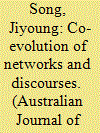

|
|
|
|
|
| Summary/Abstract |
This article uses an eclectic approach of network and discourse analyses to examine symbiotic relations between the formation of professional networks and the constitution of normative discourses in international affairs. Based on more than 2000 English and Korean mixed materials about the five most-mentioned North Korean defector-activists in the media in 1998–2015, and assisted by a computer-based content analysis tool, the author demonstrates how each of those five defector-activists has employed their endogenous identities to join the system of international human rights activism and offered legitimate narratives for the campaigns against North Korea, while forming transnational networks in South Korea, the USA and the UK. She argues that individuals’ endogenous identities and agency are critical for shaping normative discourses in international human rights activism against North Korea in the first instance, which then grow exponentially through transnational networks formed by individuals.
|
|
|
|
|
|
|
|
|
|
|
|
|
|
|
|
| 3 |
ID:
153315


|
|
|
|
|
| Summary/Abstract |
This article examines how contestable market theory (contestability) has come to reconfigure the economic and regulatory concept of competition in order to enhance the compatibility of Australia’s economy with international trade and investment agreements. Australia has recently negotiated and signed a raft of bilateral, plurilateral and regional agreements, including the Trans-Pacific Partnership Agreement and the Australia–China Free Trade Agreement. In order to ensure that Australia meets its obligations and commitments to these agreements, two key advisory bodies—the Harper Panel on Competition Policy Review and the Financial System Inquiry—made recommendations, the majority of which were accepted by the government, to ready Australia’s competition governance and economic policy for greater global integration. Such impact is dependent on, among other things, how domestic competition policy meshes with the free market ideology underpinning such international agreements, which favours the breakdown of barriers to markets. Less well known is the role of contestability in radicalising ideology as it countenances monopolisation and privatisation in the guise of market access by justifying the substitution of actual competition with the mere threat of competition. The article concludes that the monopoly power of transnational corporations will be enhanced through the acquiescence of governments to the new governance regime of the Trans-Pacific Partnership Agreement, which, supported by domestic policy, is set to redraw competition policy in the light of contestability theory.
|
|
|
|
|
|
|
|
|
|
|
|
|
|
|
|
| 4 |
ID:
153314
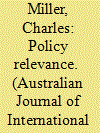

|
|
|
|
|
| Summary/Abstract |
The academic international relations community has come under fire, both in Australia and overseas, for its supposed irrelevance to real-world issues. Recommendations have been made for ‘bridging’ this ‘gap’ between the scholarly and policy worlds. This article takes a sceptical look at some of these recommendations. While this article argues that international affairs academics should be judged on their ability to provide value to society, it also notes that the best way to do so is to capitalise on the academy’s comparative advantages in order to produce high-quality inputs to the public debate. This article expresses concern that some of the recommendations put forward to bridge the gap may, by compromising impartiality, excessively curtailing the time frames for good research, and neglecting theoretical and methodological rigour, run the risk of reducing academia’s value to society.
|
|
|
|
|
|
|
|
|
|
|
|
|
|
|
|
| 5 |
ID:
153309


|
|
|
| 6 |
ID:
153310
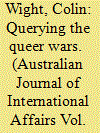

|
|
|
| 7 |
ID:
153311


|
|
|
| 8 |
ID:
153307


|
|
|
|
|
| Summary/Abstract |
Dennis Altman and Jonathan Symons’ book Queer Wars is a useful point of departure for thinking about sexual orientation and gender identity issues in contemporary international politics. It is motivated by two important empirical questions.
|
|
|
|
|
|
|
|
|
|
|
|
|
|
|
|
| 9 |
ID:
153312
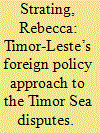

|
|
|
|
|
| Summary/Abstract |
Over recent years, Australia and Timor-Leste’s bilateral relationship has been consumed by contested maritime boundary claims in the resource-rich Timor Sea. Intractable disagreements over the right to build a petroleum export pipeline have led Timor-Leste to reinvigorate its pursuit of permanent maritime boundaries as ‘a national priority’. This article examines Timor-Leste’s interests in the Timor Sea and assesses its strategies for achieving its foreign policy goals. It argues that Timor-Leste’s attainment of its stated goals relies on Australia shifting its Timor Sea policy, which has been largely consistent since the 1970s. Timor-Leste’s key strategy is a public diplomacy campaign that positions permanent maritime boundaries as the final stage of its independence struggle, and presents Timor-Leste as owning the disputed Greater Sunrise gas field under international law. While the public diplomacy campaign aims to win enough Australian ‘hearts and minds’ to put pressure on the Australian government, it ultimately fails to negotiate the strategic and historical realities of the interests that define Australia’s realpolitik approach to the Timor Sea.
|
|
|
|
|
|
|
|
|
|
|
|
|
|
|
|
| 10 |
ID:
153316
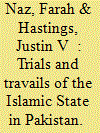

|
|
|
|
|
| Summary/Abstract |
While Pakistan is in many ways an ideal location for transnational terrorist groups due to state weakness, Islamic State has had difficulty making headway in the country. In this article, the authors argue that Islamic State’s failures in Pakistan are due to competition from other groups. Drawing on the terrorist competition literature and interviews with Pakistani counterterrorism officials, the authors find that the presence of other groups in Pakistan meant there was little demand for what Islamic State offered. Islamic State relied on splinter groups and defectors for recruitment, which alienated mainstream groups and harmed the group’s capacity. Islamic State’s competition problems were exacerbated by its internationalist ideology, which was at odds with that of many groups in Pakistan, and allowed opposing groups to present themselves as reasonable alternatives to other actors. Despite Islamic State’s lack of success, it and its allies have still engaged in extreme violence in Pakistan as a result of attempts to outbid other groups. This article has implications for fighting terrorism in Pakistan and more generally.
|
|
|
|
|
|
|
|
|
|
|
|
|
|
|
|
|
|
|
|
|